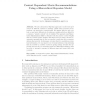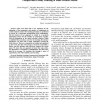2040 search results - page 79 / 408 » Approximate Expectation Maximization |
AI
2009
Springer
15 years 6 months ago
2009
Springer
Abstract. We use a hierarchical Bayesian approach to model user preferences in different contexts or settings. Unlike many previous recommenders, our approach is content-based. We...
130
Voted
ICTAI
2010
IEEE
14 years 8 months ago
2010
IEEE
This work deals with a new technique for the estimation of the parameters and number of components in a finite mixture model. The learning procedure is performed by means of a expe...
STOC
2002
ACM
15 years 11 months ago
2002
ACM
: We initiate the study of a new measure of approximation. This measure compares the performance of an approximation algorithm to the random assignment algorithm. This is a useful ...
102
click to vote
ENTCS
2006
14 years 11 months ago
2006
This paper extends the domain theoretic method for solving initial value problems, described in [8], to unbounded vector fields. Based on a sequence of approximations of the vecto...
CDC
2010
IEEE
14 years 6 months ago
2010
IEEE
Abstract-- We consider reinforcement learning, and in particular, the Q-learning algorithm in large state and action spaces. In order to cope with the size of the spaces, a functio...


